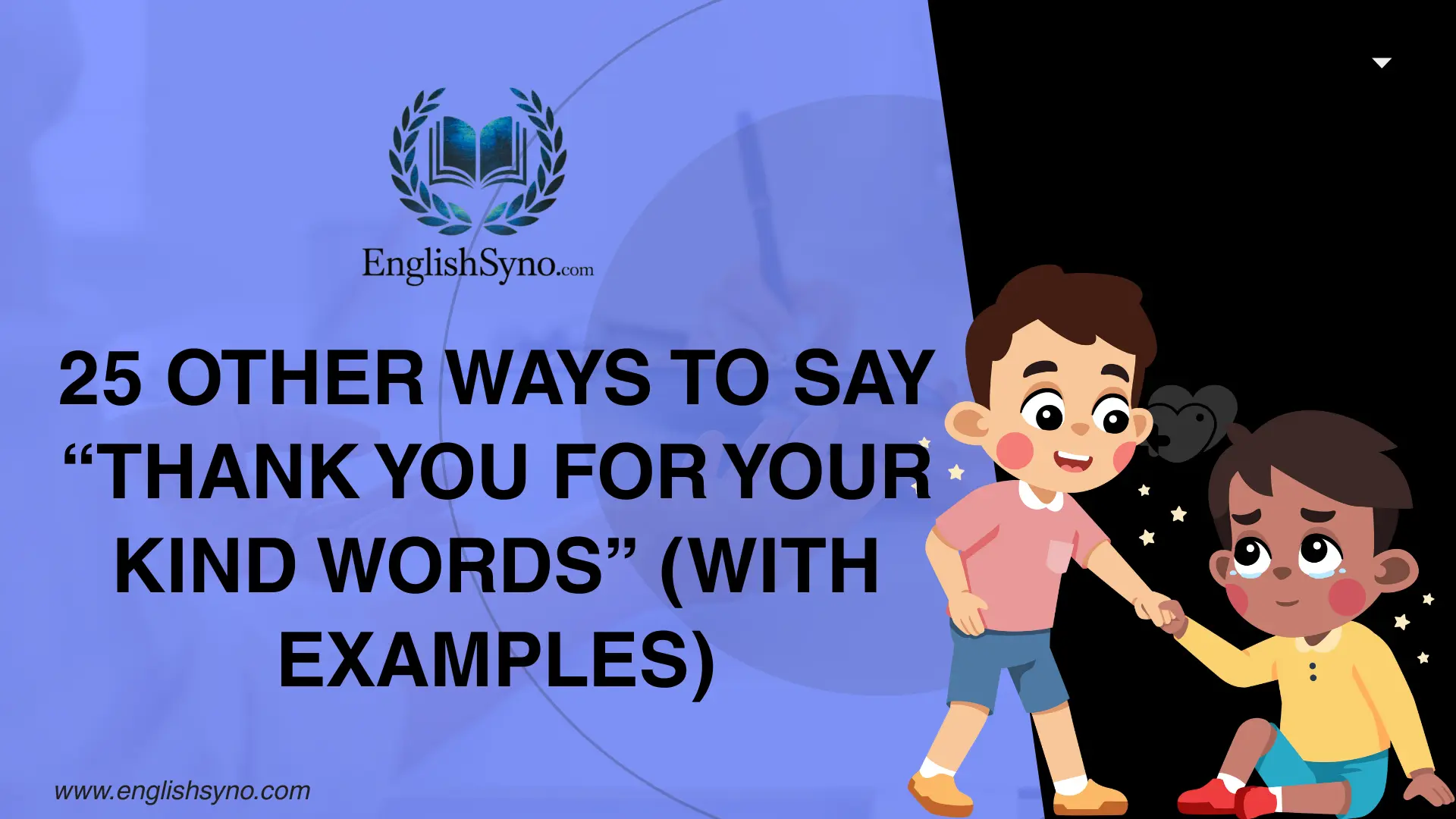I’ve often seen and heard people responding with the simple sentence “thank you for your kind words,” which really made my day more than once and conveys heartfelt appreciation in both professional and casual settings, making it a polite phrase to express gratitude for an encouraging message or compliment.
In my experience, the overall purpose of saying thank you is to acknowledge the sentiment behind someone’s words. I’ve received appreciative comments at a doctor’s appointment or during chats, and the response touches people in meaningful ways. Depending on the context, the speaker may think their words are small, but they add warmth and value. Better ways of expressing thanks come from familiarity, understanding the occasion, and making the message personal without losing the polite, appreciative tone others expect.
What Does “thank you for your kind words” Mean?
Definition & Meaning: This phrase is a polite way to acknowledge compliments, encouragement, or supportive messages. It shows that you value what someone has said.
Detailed Explanation: When someone says something positive about your actions, achievements, or character, this phrase conveys gratitude and recognition. It’s versatile for emails, messages, and in-person conversations.
Example: “Thank you for your kind words about my presentation yesterday; it truly means a lot to me.”
When to Use “thank you for your kind words”
Use this phrase when you want to acknowledge someone’s support, show gratitude, and maintain a respectful tone. Ideal for professional emails, social media replies, or face-to-face interactions.
Is It Professional/Polite to Say “thank you for your kind words”?
Yes, it is both professional and polite. It’s a safe phrase for work settings, networking, or formal conversations, while also being warm and personable in casual interactions.
Pros or Cons
Pros: Polite, versatile, clear, conveys gratitude, maintains a positive tone.
Cons: Can feel trite if overused, may come across as generic in informal settings.
I really appreciate your feedback
Definition & Meaning: Shows genuine recognition of someone’s opinion or comment.
Detailed Explanation: Emphasizes that you value the thoughtfulness and effort behind their words.
Example: “I really appreciate your feedback on my project; it helps me improve significantly.”
Best Use: Workplace evaluations, peer reviews, mentoring.
Worst Use: Overly casual compliments where emotional warmth is expected.
Tone: Professional, sincere, reflective.
Your words mean a lot to me
Definition & Meaning: Highlights personal impact of the compliment or encouragement.
Detailed Explanation: Communicates that the comment had emotional significance beyond mere formality.
Example: “Your words mean a lot to me-thank you for supporting me through this tough time.”
Best Use: Personal or heartfelt situations.
Worst Use: Standard workplace praise where brevity is preferred.
Tone: Warm, personal, sincere.
I’m grateful for your kind words
Definition & Meaning: A slightly more formal version of gratitude that emphasizes being thankful.
Detailed Explanation: Ideal when you want to balance politeness with emotional acknowledgment.
Example: “I’m grateful for your kind words regarding my presentation-it encourages me to keep improving.”
Best Use: Emails, formal meetings, written acknowledgments.
Worst Use: Overly casual texting with friends; may sound stiff.
Tone: Polite, appreciative, balanced.
Thank you for your support
Definition & Meaning: Recognizes both words and actions, broader than just a compliment.
Detailed Explanation: Works well when someone not only gives verbal praise but also actively helps you.
Example: “Thank you for your support during our project-it truly made a difference.”
Best Use: Colleagues, mentors, friends during projects or challenges.
Worst Use: Generic, non-specific feedback that may not involve support.
Tone: Warm, appreciative, professional.
Your encouragement means so much
Definition & Meaning: Focuses on uplifting impact of the message.
Detailed Explanation: Highlights how someone’s words have motivated or inspired you.
Example: “Your encouragement means so much-it gave me confidence to present today.”
Best Use: Personal growth, mentorship, challenging situations.
Worst Use: Minor or casual compliments; may feel overdramatic.
Tone: Encouraging, sincere, heartfelt.
I truly value your kind words
Definition & Meaning: Expresses high appreciation and recognition of effort.
Detailed Explanation: Signals that the words are not taken lightly and have lasting meaning.
Example: “I truly value your kind words about my work; they motivate me to keep going.”
Best Use: Professional, formal, or emotionally significant situations.
Worst Use: Short social media comments; may feel overly formal.
Tone: Respectful, appreciative, thoughtful.
I’m so thankful for your kind words
Definition & Meaning: Expresses deep gratitude, emphasizing emotional appreciation.
Detailed Explanation: Shows that the compliment or support had a personal impact and is genuinely valued.
Example: “I’m so thankful for your kind words about my performance-they really encouraged me today.”
Best Use: Personal messages, close colleagues, mentors.
Worst Use: Very casual or impersonal interactions.
Tone: Warm, heartfelt, sincere.
I appreciate your thoughtfulness
Definition & Meaning: Highlights recognition of effort and consideration behind the words.
Detailed Explanation: Goes beyond a simple “thank you” by acknowledging that the other person took time to be supportive.
Example: “I appreciate your thoughtfulness in sending that encouraging message-it meant a lot to me.”
Best Use: Emails, notes, or verbal acknowledgment in professional or personal settings.
Worst Use: Insincere or automatic replies.
Tone: Polite, reflective, grateful.
Your feedback is greatly appreciated
Definition & Meaning: A professional way to acknowledge constructive comments.
Detailed Explanation: Common in workplace or academic settings to show that the feedback is valued and considered.
Example: “Your feedback is greatly appreciated on my report-it helps me improve my work.”
Best Use: Professional reviews, formal emails.
Worst Use: Casual compliments from friends; sounds stiff.
Tone: Formal, polite, appreciative.
That really made my day
Definition & Meaning: Emphasizes the positive emotional impact of the words.
Detailed Explanation: Lets the speaker know their words had a direct and uplifting effect.
Example: “That really made my day-thank you for your encouraging words about my project.”
Best Use: Friendly, casual, or semi-formal interactions.
Worst Use: Professional emails where brevity is expected.
Tone: Cheerful, warm, personal.
I’m touched by your words
Definition & Meaning: Expresses emotional resonance and gratitude.
Detailed Explanation: Indicates that the message affected you personally, showing empathy and connection.
Example: “I’m touched by your words-it means so much to hear that from you.”
Best Use: Personal encouragement, heartfelt notes.
Worst Use: Overused in casual, light-hearted comments.
Tone: Warm, sincere, emotional.
I’m humbled by your kind words
Definition & Meaning: Shows modesty while appreciating recognition.
Detailed Explanation: Indicates that you value the praise but remain modest and approachable.
Example: “I’m humbled by your kind words about my efforts-it truly inspires me.”
Best Use: Professional recognition, awards, or mentoring feedback.
Worst Use: Casual settings with friends; may seem formal.
Tone: Polite, humble, appreciative.
Your words are very encouraging
Definition & Meaning: Acknowledges that the words motivate and uplift.
Detailed Explanation: Focuses on the supportive impact rather than just thanking.
Example: “Your words are very encouraging; I feel more confident moving forward.”
Best Use: Mentorship, professional guidance, and team feedback.
Worst Use: Insincere compliments or minor praise.
Tone: Motivational, appreciative, positive.
I value your kind thoughts
Definition & Meaning: Expresses appreciation for the thought behind the words.
Detailed Explanation: Highlights that the sentiment itself is recognized and meaningful.
Example: “I value your kind thoughts during this challenging project-it gives me strength.”
Best Use: Personal and professional interactions where thoughtfulness matters.
Worst Use: Generic compliments; may sound overly formal.
Tone: Thoughtful, warm, sincere.
I feel grateful for your encouragement
Definition & Meaning: Combines gratitude with recognition of motivational support.
Detailed Explanation: Makes it clear that the words had a real impact on your feelings or performance.
Example: “I feel grateful for your encouragement today; it motivated me to keep going.”
Best Use: Mentoring, professional or personal support.
Worst Use: Minor, casual compliments; may seem exaggerated.
Tone: Warm, appreciative, motivating.
I truly appreciate your kind words
Definition & Meaning: Emphasizes sincere acknowledgment of a compliment.
Detailed Explanation: Highlights that the words were meaningful and not overlooked.
Example: “I truly appreciate your kind words about my work; they motivate me to improve.”
Best Use: Emails, letters, formal discussions.
Worst Use: Very casual texting; can feel stiff.
Tone: Polite, sincere, professional.
Your compliment means a lot
Definition & Meaning: Recognizes the value of a specific compliment.
Detailed Explanation: Shows that the speaker’s words had personal significance.
Example: “Your compliment means a lot to me-I really appreciate it.”
Best Use: Personal, friendly, or semi-formal settings.
Worst Use: Generic or repeated compliments; may feel empty.
Tone: Warm, appreciative, sincere.
I’m honored by your words
Definition & Meaning: Conveys respect and gratitude, especially for praise.
Detailed Explanation: Suitable when the words reflect recognition of effort or achievement.
Example: “I’m honored by your words about my leadership on this project.”
Best Use: Awards, professional recognition, formal acknowledgment.
Worst Use: Casual compliments from peers; may feel overly formal.
Tone: Respectful, sincere, professional.
It means a lot to hear that from you
Definition & Meaning: Highlights the source of praise as meaningful.
Detailed Explanation: Shows that the relationship or context makes the words even more significant.
Example: “It means a lot to hear that from you; I truly value your feedback.”
Best Use: Close colleagues, mentors, or friends.
Worst Use: Generic praise from someone neutral; may feel exaggerated.
Tone: Personal, warm, sincere.
I’m grateful for your support and words
Definition & Meaning: Acknowledges both encouragement and action.
Detailed Explanation: Covers cases where words and actions combine to help or motivate.
Example: “I’m grateful for your support and words during this challenging period.”
Best Use: Mentoring, teamwork, and personal guidance.
Worst Use: Minor compliments; may seem formal.
Tone: Appreciative, professional, heartfelt.
I appreciate your encouragement
Definition & Meaning: Simple yet direct acknowledgment of motivational support.
Detailed Explanation: Shows that you value their effort in uplifting or guiding you.
Example: “I appreciate your encouragement; it helped me finish the task confidently.”
Best Use: Personal growth, mentorship, workplace guidance.
Worst Use: Overused or generic compliments.
Tone: Warm, direct, professional.
Your message brightened my day
Definition & Meaning: Highlights emotional impact and positivity of words.
Detailed Explanation: Shows that the compliment or support had a cheerful and uplifting effect.
Example: “Your message brightened my day-thank you for your kind words.”
Best Use: Casual and semi-formal interactions.
Worst Use: Formal professional communication; may feel informal.
Tone: Cheerful, warm, personal.
I’m thankful for your kind sentiments
Definition & Meaning: Formal acknowledgment of both words and intention.
Detailed Explanation: Works well when recognizing thoughtfulness and emotional support.
Example: “I’m thankful for your kind sentiments regarding my work-it inspires me.”
Best Use: Professional emails, letters, or formal discussions.
Worst Use: Casual chat; may sound stiff.
Tone: Polite, formal, appreciative.
Your words uplifted me
Definition & Meaning: Direct acknowledgment of positive emotional effect.
Detailed Explanation: Emphasizes that the message motivated or inspired you.
Example: “Your words uplifted me during a challenging day-thank you for sharing.”
Best Use: Mentorship, guidance, personal encouragement.
Worst Use: Overly casual or trivial compliments.
Tone: Warm, motivating, sincere.
I’m appreciative of your kind words
Definition & Meaning: Polite and formal acknowledgment of gratitude.
Detailed Explanation: Covers both professional and personal contexts where you want to show thoughtful recognition.
Example: “I’m appreciative of your kind words about my presentation; they mean a lot to me.”
Best Use: Professional emails, letters, semi-formal situations.
Worst Use: Overly casual texting; can feel formal.
Tone: Polite, appreciative, professional.
Final Thoughts
Expressing gratitude through words is an art that goes beyond simply saying “thank you for your kind words.” Choosing the right phrase can make your message feel genuine, warm, and thoughtful, strengthening personal and professional connections. The alternatives explored-ranging from “I truly appreciate your kind words” to “Your words uplifted me,” allow you to convey appreciation while adapting to the context, tone, and relationship. Each phrase carries its own nuance: some are formal and professional, ideal for workplace communication or official correspondence, while others are personal and heartfelt, perfect for friends, mentors, or situations that require emotional depth.
Using these alternatives ensures your gratitude is specific, meaningful, and memorable, avoiding the pitfall of sounding generic or trite. By carefully considering the context-whether it’s a casual chat, a professional email, or a heartfelt message-you can choose phrases that match the sentiment, making the recipient feel valued and acknowledged. Incorporating phrases that reflect personal experience or impact, such as “That really made my day” or “I’m touched by your words,” adds authenticity. Over time, mastering these expressions fosters better relationships, encourages positive communication, and enhances your emotional intelligence.
Gratitude is more than etiquette; it’s a bridge that connects hearts and minds, and selecting words with care can transform a simple acknowledgment into a meaningful interaction. Thoughtful phrasing not only strengthens bonds but also creates a lasting impression of sincerity and appreciation in all your interactions.
FAQs
What does “thank you for your kind words” mean?
It’s a polite phrase to acknowledge compliments or supportive messages, showing gratitude and appreciation for someone’s encouragement.
When should I use it?
Use it in professional or casual settings whenever someone offers praise, feedback, or supportive words.
Is it professional?
Yes, it works in emails, meetings, and networking while remaining polite and approachable.
Can I use alternatives?
Absolutely. Alternatives like “I truly appreciate your kind words” or “Your words uplifted me” convey the same gratitude in different tones.
What tone is best?
Warm, sincere, and appreciative tones are ideal, avoiding overuse or generic responses.
Can it feel trite?
If overused or automatic, it may seem insincere, so personalization is key.
Is it suitable for friends?
Yes, casual alternatives like “That really made my day” work well among friends.
Can it be formal?
Formal alternatives such as “I’m appreciative of your kind words” suit professional correspondence.
How do I add personalization?
Mention specific feedback, actions, or encouragement to show the words impacted you personally.
Can it be used in messages?
Yes, it works in text, email, or social media, adjusting tone accordingly.
Are there negative effects of misuse?
Generic or repeated phrases can feel trite or dismissive, undermining sincerity.
Should I use it in meetings?
Yes, it demonstrates professional gratitude and acknowledges support or praise.
How does it impact relationships?
Thoughtful expressions of gratitude strengthen trust, positivity, and emotional connection.
Can it be overused?
Yes, frequent repetition without context can reduce impact; vary your phrases.
Why are alternatives important?
They allow context-sensitive, heartfelt responses that maintain sincerity and foster meaningful communication.

Muhammad Altaf is an English language specialist and professional content strategist with over 10 years of experience writing and teaching practical English usage, professional communication, and tone awareness. His work focuses on helping readers express ideas clearly, naturally, and confidently in real-world contexts.


